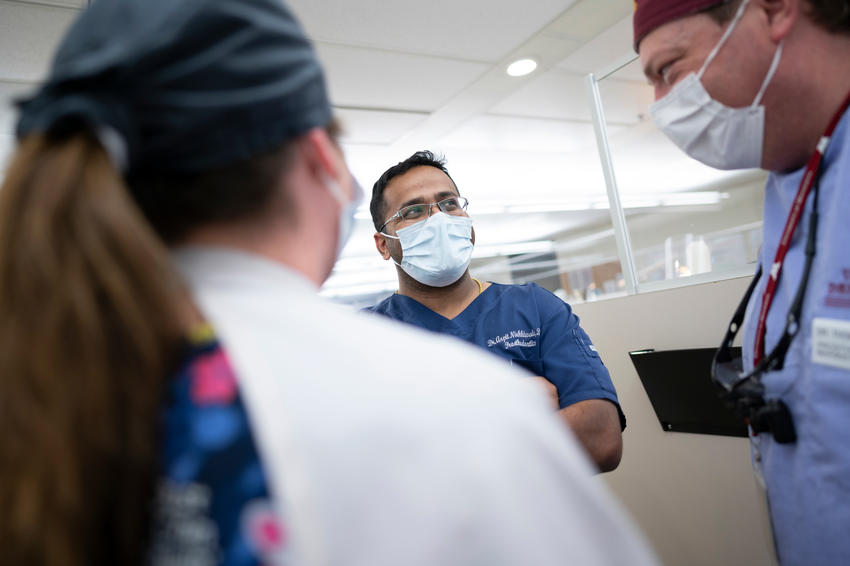Encouraging questions at the Oral Health Clinical Research Center

Questions are what drive scientific discovery. Big questions—the ones that keep us up at night—foster a desire for learning that never stops. They dare us to dream, to think differently. And they are how we transform our patient care.
The School of Dentistry holds as a guiding principle a commitment to lifelong discovery through research that innovates the practice and study of dentistry. A core part of that commitment is the Oral Health Clinical Research Center (OHCRC).
Founded decades ago, the OHCRC enhances oral health by fostering research and encouraging its application in real-world settings. In 2019, Eric Schiffman, DDS, MS, became director of clinical research and of the OHCRC. “The center was in need of rejuvenation,” he recalled. Schiffman was excited to provide the leadership to improve the physical space while mentoring faculty in their research endeavors, including funded research proposals.
For Schiffman, the center’s purpose is crucial as receiving grant funds continues to become more challenging. He sees the need to support faculty members throughout every step of the process: from formulating a research question to writing and submitting a proposal and providing research personnel and space for the research to be done.
“Without these services, what faculty can do is limited, especially since they often have other responsibilities,” he said. “When they have clinically significant and innovative ideas, we want to help them make those ideas a reality.”
With help from Gary Anderson, DDS, MS, and Palak Bothra, BDS, MPH, the School of Dentistry joined the BigMouth Dental Data Repository, an oral health database developed from partially deidentified electronic health record data provided by eleven dental schools throughout the United States. The partnership provides researchers with data, while the center provides IT support.
The dual relationship between clinical care and research is crucial to Schiffman, who asserted that “we need clinical research in order to improve patient care.” That core belief, combined with his experience participating in a clinical study in the NIH-funded National Dental Practice-Based Research Network, led him to establish the School of Dentistry’s Practice-Based Research Network within the center, where patients receive real-time care from faculty and students while seeking answers to clinically significant questions.
“The critical function of the PBRN is, instead of doing studies that aren’t directly applicable to the clinical setting, the findings can be immediately implemented in everyday clinical practice,” he said. Moreover, the network fosters clinical faculty and student involvement and can have a significant impact on students’ education. “I want clinical faculty and students involved in research,” Schiffman said, “so that it becomes natural to do it while they’re providing patient care. When students go into their clinical practices, they’ll find it natural to do clinical research and join the National Dental Practice-Based Research Network.”
As the center continues to grow, Schiffman’s main goal is clear: expanding the school’s research base and fostering interest in obtaining externally-funded research. In 2019, he established the Frank W. Veden Endowment for Clinical Research grant program that provides faculty with $20,000 awards. “I thought we could take things a step further,” Schiffman explained of the fund, which has its origins in a gift funded through Frank W. Veden’s estate. Established in 1990, funds were granted through Veden’s estate in 1997. A dentist and 1936 graduate from the School of Dentistry, Veden established the fund, to which others have continued to contribute, out of his desire to encourage clinical research and its ability to transfer basic science knowledge into practical applications.
“We want to provide faculty with startup funds to do pilot projects, and then encourage them to use the findings to submit grant proposals to external funding agencies,” Schiffman explained of his use of the fund for faculty grants.
Schiffman is proud of the studies that have come out of the Oral Health Clinical Research Center, and what he sees coming in the future. From the PBRN’s first study comparing the utility of using loupe mounted digital cameras to provide better in-clinic feedback for students than looking over a faculty member’s shoulder, to comparing adhesive materials with a 3M-funded study, excited to celebrate research and foster the future of scientific discovery—and he wants to welcome as many researchers to the center as possible.
“I want to help faculty from the very beginning, help them finalize their thoughts on a research question and support them every step of the way,” he said. “We’re open for business. We’re here to support clinical research in the school, to help faculty start or continue a successful research career.”
To learn more about the OHCRC and get involved, see our website or contact Eric Schiffman.